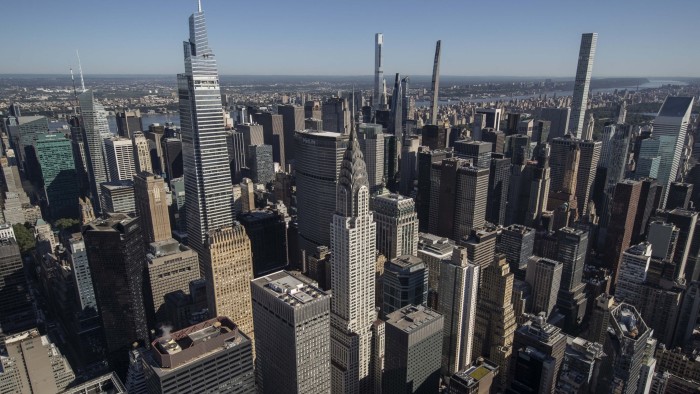Investors raise billions to buy discounted stakes in start-ups

Roula Khalaf, Editor of the FT, selects her favourite stories in this weekly newsletter.
Investment firms are raising billions of dollars to buy stakes in venture capital-backed technology start-ups, as a long drought in acquisitions and initial public offerings forces early investors to offload their stock at discounts.
The start-up secondary market, where investors and employees buy and sell tens of billions of dollars’ worth of shares in privately held companies, is becoming an increasingly important trading venue, in the absence of traditional ways of cashing out and given a slowdown in start-up funding.
Venture secondaries buyers are primed for a busy year as start-up employees look for a way to sell their stock and investors look to return capital to their own backers or reallocate it elsewhere.
Secondary market specialist Lexington Partners last week announced a new $23bn fund to buy up stakes from “large-scale investors”. Lexington had originally aimed to raise $15bn, but upped its target on the back of high demand, and said it was “in the early stages of a generational secondary buying opportunity” that could last years.
The fund will predominantly buy shares from private equity funds but also expects to invest as much as $5bn into venture capital secondaries, said a spokesperson.
“We are seeing crazy amounts of [limited partner investors] that are distressed and need to lighten their venture load,” said the head of a $2bn venture capital firm.
The latest Lexington fund “speaks to the sheer demand” from LPs that feel “over-allocated” to private capital including to start-ups, they said.
Other specialist firms such as Pinegrove Capital Partners, a joint vehicle created by Brookfield Asset Management and Sequoia Heritage, and StepStone have also been raising multibillion-dollar funds to target venture secondaries.
StepStone has raised an initial $1.25bn for its latest fund, according to Securities and Exchange Commission filings and earnings transcripts, and is targeting a total raise of more than twice that, said a person with knowledge of the deal.
The large sums of new capital point to a return to high levels of trading after a two-year downturn, according to investors.
The secondary market has grown massively over the past decade, with big banks, asset managers and trading firms all investing in various trading platforms. It has also become a critical release valve for start-up employees who have been unable to realise the value of their stock because of the lack of IPOs. In the last year companies including OpenAI and Elon Musk’s SpaceX have arranged the sale of employee stock via the secondary market.
“The main exit for VCs is primarily IPOs and [mergers and acquisitions], and neither of those are happening,” said Tom Callahan, chief executive of Nasdaq Private Market, a trading venue. “It creates this immense pressure . . . [and] incredible opportunities for investors coming in and buying companies at deep discounts.”
However, it is still more lightly regulated, more opaque and far less liquid than public markets. One venture investor described it as “a messy backwater market dominated by brokers on the phone”.
Carta, a $7.4bn software company backed by investors including Goldman Sachs, Andreessen Horowitz and Silver Lake, last week said it would shut down its employee-focused secondaries platform following allegations that it had tried to trade customers’ shares without their consent.
IPO activity is expected to pick up later this year, but it is still likely to take several months for volumes to normalise.
Secondaries trade stalled in 2022 as start-up valuations were belatedly hit by higher interest rates. Nasdaq Private Market’s Callahan said that at points in the past two years, venture capital firms were demanding prices 30 per cent higher than potential buyers were willing to pay.
Marcus New, chief executive of trading platform InvestX, said valuation gaps had begun to shrink as venture capital firms became “more and more distressed”, leading to an increase in the supply of shares for sale. However, he and Callahan both said hedge funds and institutional investors have remained cautious about buying shares in all but the largest and most well-known private companies.
Investors and trading platforms are hoping the arrival of specialist secondary buyers with billions of dollars to spend will make up for that and drive up volumes.
“Values will get adjusted down this quarter,” said Hans Swildens, a secondaries investor and founder of Industry Ventures. “There will be a markdown across the market. If that happens then the volume [of trade] will start spiking.”
Forge Global, a publicly traded secondary exchange for privately held stock, reported a more than 50 per cent quarter-on-quarter increase in trading volumes in the third quarter of 2023, and chief executive Kelly Rodriques told the Financial Times “that trend will continue”.
On average, recent share sales on Forge were priced at about a 50 per cent discount to each company’s most recent primary fundraising.
InvestX’s New said those willing to brave the market before the broader IPO market recovers could pick up bargains.
“We’ve been successful in putting in low-priced bids [where] we’re the only person in the market,” he said. “I think the next few months will be the best time to be a buyer of these types of securities in the past half decade.”
Comments